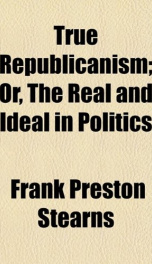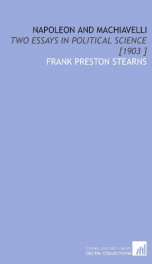true republicanism or the real and ideal in politics

Purchase of this book includes free trial access to www.million-books.com where you can read more than a million books for free. This is an OCR edition with typos. Excerpt from book: ABRAHAM LINCOLN Professor Seel Ye, in his small, disparaging biography of Napoleon, speaks of the American Presidents as a " set of adventurers." If he means by this the Presidents of the United States, he is greatly in error. There have been good Presidents and weak ones, capable Presidents and inefficient ones, but not one of those who has been regularly elected to the office can be properly styled an adventurer. Arthur and Johnson might be called adventurers, but it was not intended nor expected that they should become Presidents. It was because Aaron Burr, Stephen A. Douglas, and James G. Blaine were adventurers, that, with all their popularity and diplomatic skill, they never could obtain the position. The people of the United States always reserve to themselves the right of defeating a candidate who suffers from what is called " Presidential fever." The tendency to hereditary succession was so strong in the men of the eighteenth century that the first five Presidents after Washington were all promoted either from the Vice-Presidency or from the position of Secretary ofState. With General Jackson, however, a series of popular heroes came on to the stage, most of them good men in their way, but not well fitted either by temperament or experience for the position. De Tocqueville and other foreigners have noticed that no people are so easily captivated by military glory as the Americans, and Presidents Jackson, Harrison, and Taylor were the victors of a single battle. Grant had a long and honorable military career, though perhaps not the most brilliant; while Scott, the conqueror of Mexico, proved an unsuccessful candidate apparently because he was a man of aristocratic manners. Among all these Presidents, from Jackson to Hayes, there was only one who gave distinction to t...
Info about the book
Author:
Series:
Unknown
ISBN:
0812219775
Rating:
4.5/5 (3)Your rating:
0/5
Languge:
English
Users who have this book
Users who want this book
What readers are saying
What do you think? Write your own comment on this book!
write a commentif you like true republicanism or the real and ideal in politics try:
Do you want to exchange books? It’s EASY!
Get registered and find other users who want to give their favourite books to good hands!






